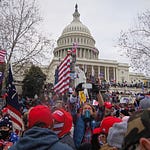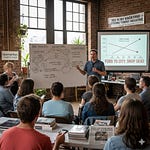In the early 1980s, when I first moved to Berlin, my immediate objective was not to find a community but to understand an artifact of its absence. I wanted to capture the feeling of the Wall 🧱. Not the politics of it, but the tangible, visceral presence of a concrete scar that had severed a city in two. I walked its entire circumference 🚶, filming 🎬 fragments—the graffiti, the watchtowers, the cold, gray expanse. It was a physical and psychological pilgrimage to the very edge of an ideology.
The stark dichotomy of that experience became even more apparent when I traveled through what was then called "Eastern Europe." Hitchhiking through that landscape, a young American, I saw the Wall's ideological shadow lift in the surprising warmth of human connection 🤝. The cognitive dissonance on the faces of drivers who picked me up—the momentary shock giving way to curiosity and an improbable hospitality—was a profound lesson.
A few even took me home to meet their families. In those fleeting moments, the simple act of sharing a meal with a stranger made a political barrier seem like a flimsy, almost ridiculous construct. I began to understand that "othering" was not a natural human state, but a vehicle, a tool of manipulation.
The Unbuilt Stage 🏛️
This journey to the periphery led me to a new center of thought. I had stumbled upon Thornton Wilder's play, Our Town 🎭. This was the time of radio 🎙️, a "hot media" in Marshall McLuhan’s terms, where the stage was not a physical space but a canvas built within the listener's own mind. I was struck by the idea of using the Berlin Wall as a backdrop for this very play, to show the profound absurdity of a physical division in a story about universal commonalities. The Wall would be the silent character, the immovable antagonist to the play's simple, heartbreaking humanity. But history had other plans. In 1989, the Wall came down, and the relevance of that particular stage was lost. The project was put on hold, perhaps permanently.
Kinship and the New Canvas 🫂
And then came February 2022. The familiar rhetoric of othering had raised its head in full display, not as a physical wall, but as a digital, political, and cultural one 🌍. I felt compelled, more than ever, to revisit that early quest. It was a call to action, to counteract this force with a new guiding principle: the "community of Kinship." I borrow this phrase from Father Greg Boyle, who raises the simple, undeniable point that we are all related. I am firmly convinced that by highlighting our commonalities, we can’t truly remain enemies.
This renewed urgency gave birth to a new artistic vision, a way to re-contextualize the project for our current moment. The stage is no longer the Berlin Wall, but the flickering backdrop of old Soviet films 🎞️ from the 1950s. I took the highlights of Wilder’s Our Town, had the narration completed in Russian, and overlaid it onto this footage. The result is a short, thirty-minute film where the story is understood not through language, but through the universal emotions on the faces of ordinary people. The shared humanity of Wilder’s narrative—birth, love, death—is amplified by the forgotten images of a society once cast as the "other." There are moments in this project that are deeply emotional, where the edges of time, culture, and ideology are woven into a single, cohesive statement about our inherent connection.
It is a project born from walking a wall, hitchhiking across a divide, and finding a voice in the pages of a play—a testament to my belief that by seeking our shared humanity in the spaces between, we can begin to tear down the walls that persist today ✨.










